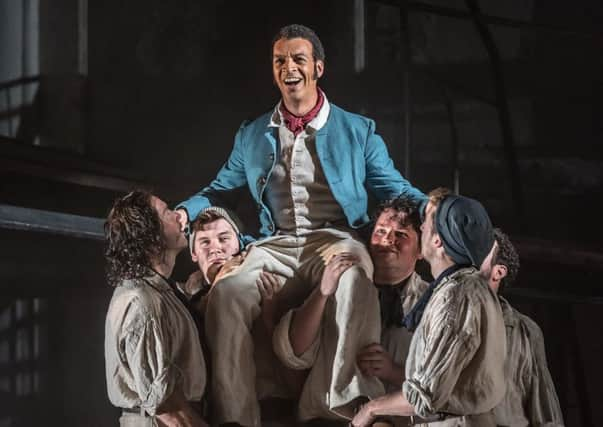Interview: Scots conductor Garry Walker on his production of Billy Budd for Opera North


But there’s no getting away from the fact that Billy Budd – based on a short novel by Herman Melville, of Moby-Dick fame – deals with suggestion, repression and intense emotion, all seething away on board the confined, all-male environment of the HMS Indomitable at the end of the 18th century. At its heart are a trio of enigmatic characters: the dark, malevolent Master-at-Arms Claggart, who takes an unaccountable dislike to the young, beautiful, rather saintly Billy, with the erudite Captain Vere looking on but seemingly incapable of doing anything to prevent the developing tragedy.
“A lot of Britten’s operas are essentially about dysfunctional, claustrophobic situations, and outsiders who come into them,” explains Garry Walker, the production’s conductor. “In Billy Budd, it’s Claggart who’s the outsider, on a boat full of men.”
Advertisement
Hide AdAdvertisement
Hide AdAnd for Walker, the opera’s enigmas are part of its appeal. “Melville doesn’t seek to answer some of the mysteries that he creates. It’s never clear why Claggart hates Billy so much – there’s a bit in the libretto that suggests that it may be Billy’s goodness, or his beauty, or simply because he’s different to Claggart.” Or maybe – to get back to the idea of a gay subtext – because Claggart detests the desire he feels towards Billy. EM Forster, who put together the opera’s libretto with Eric Crozier, was more straightforward on what it’s all about, calling it a tragedy of “sexual discharge gone evil”.
With spoiler warnings, Walker continues: “It’s not actually in the book, but one dramatic turn that Britten makes in the opera is the whole redemptive element. There’s almost a Christian halo around it all, as though Vere is saved by Billy’s death. What I find most comforting is the opera’s message of trying to live one’s life as positively as possible – if you continue to burn brightly, even in the darkness, at times some of that light might brighten other people’s lives too.”
Billy Budd is famously – and very unusually – an all-male opera: “So instead of a soprano against a bass, for example, you’ll have a tenor against a baritone against a bass, all singing in the same kind of area. But Britten’s very clever at differentiating, and with the singers we have in this production, you just kind of sit back and marvel.”
It’s true that the production’s central trio of singers – Roderick Williams in the title role, Alan Oke as Vere and Alastair Miles as Claggart – are some of the UK’s most eminent vocal names, and they’ve understandably drawn adulation in the touring production’s stop-offs so far. “I couldn’t have asked for better shipmates,” says Walker, “and a show like this also really shows you the strength of having a chorus that’s always together, works well together and have a real bond with each other – it’s absolutely crucial.”
Walker himself, a former pupil of St Mary’s Music School in Edinburgh, is increasingly in demand internationally, but keeps a foot firmly on Scottish soil. “I’ve just been appointed principal conductor of the Rhine Philharmonic in Koblenz, and I’m also artistic director of conducting at the Royal Conservatoire of Scotland in Glasgow. I’m delighted to be working in Germany – it’s a real cultural powerhouse – but I do have a firm commitment to Scotland too. As a Scot, I want to be part of the scene here, and I like to feel I can make a difference with my role at the RCS.” It’s down to happy coincidence rather than any Caledonian arm-twisting that Walker is bringing Billy Budd north of the Border, but it’s a production that looks set to both entertain and provoke – however overt or covert its subtexts. ■
*Opera North’s Billy Budd is at Edinburgh’s Festival Theatre on 1 and 3 December, with Il tabarro/Suor Angelica on 30 November and 2 December, www.operanorth.co.uk.